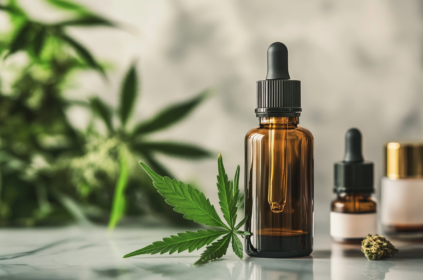Why White Labeling is a Game-Changer in the CBD Wellness Industry
The CBD wellness industry has seen a meteoric rise in recent years, largely due to a growing consumer interest in natural, plant-based health solutions. As this dynamic market continues to expand, one business strategy has gained notable traction—white labeling. This practice is transforming how brands operate and compete, making it essential for anyone interested in the CBD space to understand its implications.
Understanding White Labeling
At its core, white labeling involves a manufacturer producing products that other companies rebrand and sell under their own label. In the CBD sector, this means that emerging brands can penetrate the market without the overheads associated with production and manufacturing. By leveraging existing infrastructure and expertise from established manufacturers, newcomers can quickly establish their presence and grow their business.
The Benefits of White Labeling in the CBD Industry
Reduced Risk and Lower Costs
Launching any new product line comes with its share of risks, but white labeling helps mitigate this significantly. Companies can avoid hefty upfront investments in manufacturing equipment, research and development, and navigating complex regulatory landscapes. This reduces the overall financial burden and lowers the entry barrier for newcomers and small businesses eager to make their mark in the CBD market.
- Cost-Effectiveness: Transitioning to the market through a white label model enables you to allocate budget resources more efficiently.
- Lowered Risk: By partnering with established manufacturers, you’ll be tapping into their production expertise and processes, reducing the chance of costly errors.
Faster Market Entry
Speed to market is a crucial factor in the booming CBD sector. White labeling allows brands to sidestep the lengthy processes associated with product development and manufacturing. These efficiencies enable brands to respond to evolving consumer trends and demands almost immediately.
- Trend Responsiveness: Quickly capitalize on popular trends, like CBD-infused beverages or specialty vegan gummies.
- Immediate Presence: Instead of waiting months for product development, you can be selling unique CBD products within weeks.
Focus on Branding and Marketing
Instead of getting bogged down with the complexities of product manufacturing, white labeling offers brands the invaluable opportunity to concentrate on what matters most—branding and customer engagement. A compelling brand presence can make all the difference in a saturated market.
- Enhanced Marketing Strategies: With fewer resources tied to production, brands can invest more in crafting innovative marketing campaigns and promotional events.
- Strong Brand Identity: Time and resources can be spent on design elements, ensuring you stand out in an increasingly crowded marketplace.
Market Innovation and Product Development
Diverse Product Offerings
Today’s consumers crave options tailored to their specific needs. White labeling allows brands to make use of a vast array of products—from oils and tinctures to edibles and topical applications—ensuring there’s something for everyone.
- Product Variety: Create a portfolio featuring CBD beverages, wellness capsules, and soothing lotions tailored for an array of customer preferences.
- Consumer-Centric Customization: Adapt offerings based on consumer demand and feedback, ensuring your products stay relevant and desired.
Personalization and Customization
Another advantage is personalization. The modern consumer is increasingly looking for tailored solutions to their health concerns. Using white labeling, brands can offer varying CBD concentrations or add supplemental ingredients, thereby catering to specific needs.
- Targeted Formulations: Products designed for sleep can include calming herbs like chamomile, while those for athletic recovery might feature turmeric.
- Consumer Engagement: Tailor products based on direct feedback and health trends, encouraging active participation in your brand’s development.
Sustainability and Transparency
As consumers grow more aware of the environmental and ethical implications of their purchases, brands incorporating sustainable practices gain a competitive edge. White label partners committed to sustainability can enhance brand reputation through eco-friendly product offerings and transparent sourcing practices.
- Green Initiatives: Utilize organic, non-GMO hemp and eco-friendly packaging materials that resonate with environmentally conscious consumers.
- Build Trust: Transparent sourcing fosters trust and loyalty—a key factor in the wellness-based consumer market.
Gaining a Competitive Advantage
Differentiation in a Crowded Market
Brand differentiation in the CBD space is vital. With a plethora of products vying for attention, white labeling allows companies to establish unique selling points that resonate with customers.
- Stand Out with Branding: Focus on creating educational, engaging content that enhances consumer understanding and experience.
- Problem-Solving Focus: Emphasize how your products meet specific needs—be it anxiety relief, sleep support, or fitness recovery.
Quality Assurance
Quality control is paramount. By partnering with reputable white label suppliers, brands can ensure that every product adheres to high standards and is thoroughly tested for safety and efficacy.
- Trust Through Testing: Look for suppliers who provide third-party lab testing results, ensuring the potency and safety of all products.
- Regulatory Compliance: Partnering with compliant manufacturers reduces legal risks and builds consumer trust.
How to Choose the Right White Label Partner
Quality Ingredients and Manufacturing
Selecting a partner that uses high-quality hemp and adheres to safe extraction practices is essential. You’ll want to look for companies employing methods like CO₂ extraction, as this tends to yield purer and more potent products.
Compliance and Testing
Ensure your partner conducts thorough third-party lab testing to confirm the potency and safety of their products. Compliance with industry regulations is crucial for maintaining consumer trust and avoiding potential legal entanglements.
Product Variety and Customization Options
Choose a white label partner with an extensive range of products and customization options. This way, you can cater to specific market segments while maintaining the flexibility to adapt offerings.
Actionable Tips
- Research Suppliers: Always vet potential white label suppliers for quality and reputation in the industry.
- Invest in Branding: Dedicate resources to building a cohesive and recognizable brand identity.
- Ensure Compliance: Stay ahead of industry regulations to foster trust and transparency with consumers.
- Offer Unique Products: Differentiate through innovative offerings that meet specific customer needs.
If you’re interested in entering the booming CBD wellness market, fill out the form, and one of the top CBD white label companies will reach out to you.




















